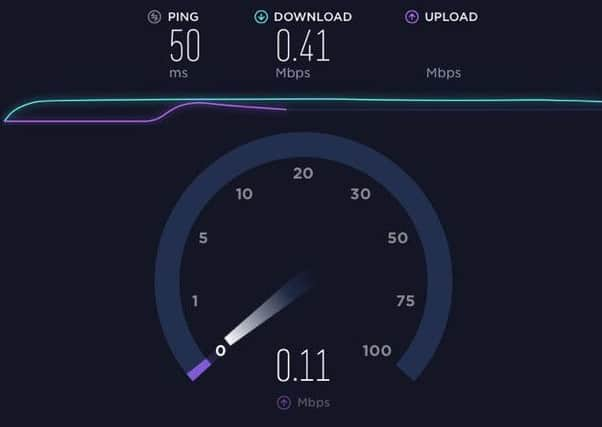Glencoe Mountain ski resort battles with poor internet connection, forced to do business 'like it's 1899'


Having said all that, however... there’s really no getting away from the fact that Glencoe Mountain ski resort has a serious problem with its internet connection. How serious? Here’s Glencoe’s owner and managing director Andy Meldrum on what he and his team are up against:
“At the moment we’re relying solely on mobile data to take card payments, send emails, do everything, because the [landline] connection we get from BT is so bad. We get a maximum of 0.2 mbps [megabytes per second] on old copper lines that run through one of the oldest exchanges in the country at the King’s House Hotel. If we lose our mobile signal we’re basically just dead in the water. We can’t do emails, we can’t do payroll, we can’t do anything.” *
Advertisement
Hide AdAdvertisement
Hide AdMobile phone reception at the ski centre isn’t all that reliable either, and when the mobile network goes down, which it does from time to time, and the credit card machines in the ticket office suddenly stop working, staff at Glencoe are forced to do business like it’s 1899 – trying to persuade skiers to pay for their lift passes in cash wherever possible, and in cases where people don’t have enough folding money with them, scribbling down names and addresses and then issuing invoices, in the hope that payment will be forthcoming at some point in the future.
Also, because the vast majority of Glencoe’s skiing customers tend to arrive first thing in the morning, with the aim of maximising their time on the hill, even a still-functioning but slower-than-usual internet connection can cause problems. “You’ll know yourself what it’s like on a busy morning when you’ve got 1,000 people coming in an hour all trying to buy a lift ticket,” says Meldrum. “Any delay in that process just causes absolute carnage. If people come to our ticket office and our card machines are failing three or four times in a row, it means every transaction’s taking two or three minutes instead of ten seconds.”
On the up-side, the mobile signal in the area is in the process of being improved. EE are currently upgrading the mobile phone network in Glencoe, and once that work is complete the mobile signal, at least, should be more reliable. Still, running a business using only mobile phone data can be expensive. Even when the upgrade is complete, Meldrum says, “we’ll still be having to rely on really expensive mobile data for all our day-to-day requirements. We’re currently running into hundreds, maybe near £1,000 a month just on buying data.”
Somewhat ironically, internet connectivity on the mountain itself is now first rate, thanks to work Meldrum has overseen at Glencoe since taking over the running of the resort eight years ago.
“On the mountain everything’s fibre,” he says, “we can connect from the top of the mountain all the way to the bottom by fibre, we can talk to everybody, but from the bottom of this hill outwards we don’t have anything – we have an old copper line. We’ve got super-fast everything on site, but we then have no way of getting out.”
Glencoe’s internet woes are, of course, part of a much bigger picture, and when word got out that I was writing something on this topic I started receiving emails about how the situation at Glencoe relates to everything from the effectiveness of the new Emergency Services Network to the public inquiry on Connectivity in Scotland being held by the UK Parliament. Clearly there isn’t space here to do more than simply acknowledge these issues – and to remind any skiing readers planning a trip to Glencoe to please bring cash, so that everyone can get a bit more time on the hill.
*Anticipating that some readers might suspect Meldrum of over-exaggerating the scale of the problem, I asked him to run an internet speed check over the weekend of 3 and 4 February. The highest speed he recorded, following several attempts, was 0.11 mbps – I have a copy of the dashboard graphic as proof. To put that number in context, if Meldrum took a typical five megabyte smartphone photo at Glencoe and wanted to email it to me in Edinburgh using his landline connection, at 0.11 mega bits per second upload speed it would take him 363 seconds – just over six minutes – to upload it.